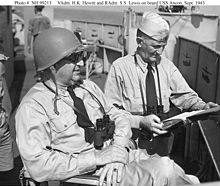H. Kent Hewitt
| Henry Kent Hewitt | |
|---|---|

Admiral H. Kent Hewitt (left) and Admiral S.S. Lewis (right) on board USS Ancon, September 1943.
|
|
| Born | February 11, 1887 Hackensack, New Jersey |
| Died | September 15, 1972 (aged 85) Middlebury, Vermont |
| Allegiance |
|
| Service/branch |
|
| Years of service | 1906–1949 |
| Rank | Admiral |
| Unit | Atlantic Fleet |
| Commands held |
USS Eagle USS Cummings USS Indianapolis Special Service Squadron Amphibious Force, Atlantic Fleet United States Eighth Fleet U.S. Naval Forces Europe |
| Battles/wars |
World War I *Battle of the Atlantic World War II *Battle of the Atlantic *Battle of Casablanca *Battle of Gela *Battle of Salerno *Operation Dragoon |
Henry Kent Hewitt (February 11, 1887 – September 15, 1972) was the United States Navy commander of amphibious operations in north Africa and southern Europe through World War II. He was born in Hackensack, New Jersey and graduated from the U.S. Naval Academy in 1906.
Hewitt served aboard USS Missouri in the Great White Fleet's circumnavigation of the globe from 1907-1909. His sea duty continued as a division officer aboard USS Connecticut and executive officer of the destroyer USS Flusser. In 1913 he was promoted to lieutenant, married Floride Louise Hunt (1887-1973), and began three years of shore duty as a Naval Academy mathematics instructor. He returned to sea in 1916 commanding the yacht Eagle in the Caribbean. Hewitt was awarded the Navy Cross commanding the destroyer USS Cummings escorting Atlantic convoys during World War I. His citation read:
The President of the United States of America takes pleasure in presenting the Navy Cross to Commander Henry Kent Hewitt, United States Navy, for distinguished service in the line of his profession as Commanding Officer of the U.S.S. CUMMINGS, engaged in the important, exacting and hazardous duty of patrolling the waters infested with enemy submarines and mines, in escorting and protecting vitally important convoys of troops and supplies through these waters, and in offensive and defensive action, vigorously and unremittingly prosecuted against all forms of enemy naval activity during World War I.
Hewitt was an instructor of electrical engineering and physics at the Naval Academy from 1919 to 1921 before returning to sea as gunnery officer aboard USS Pennsylvania. After spending three years at the Naval War College in Newport, Rhode Island, he commanded Destroyer Division Twelve with the battle fleet from 1931 to 1933. He then chaired the Naval Academy mathematics department for three years while the Naval Academy developed the Keuffel & Esser Log Log Trig slide rule. He returned to sea commanding the cruiser USS Indianapolis and transported President Franklin D. Roosevelt to the Pan-American Conference at Buenos Aires following the 1936 elections.
...
Wikipedia
